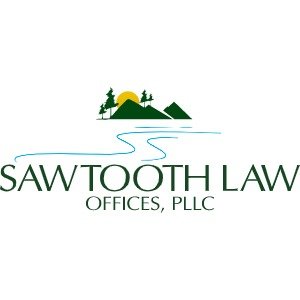Best Creditor Lawyers in Idaho
Share your needs with us, get contacted by law firms.
Free. Takes 2 min.
Or refine your search by selecting a city:
List of the best lawyers in Idaho, United States
About Creditor Law in Idaho, United States
Creditor law in Idaho governs the legal rights and responsibilities of those who are owed money, commonly known as creditors. This field covers a wide variety of scenarios, such as collecting on unpaid debts, enforcing judgments, and protecting creditor rights during bankruptcy proceedings. Idaho law sets out clear procedures for collections, how debt can be recovered, and the legal mechanisms available for creditors to secure repayment, while also ensuring that debtors' rights are protected. If you are seeking to recover money owed to you or your business, understanding the basics of creditor law in Idaho is crucial.
Why You May Need a Lawyer
There are numerous situations where legal assistance in the field of creditor law may be needed in Idaho. These include:
- Debt collection from individuals or businesses that have defaulted on payments
- Enforcing court judgments or obtaining liens against debtor property
- Responding to bankruptcy filings that may affect your ability to collect debts
- Drafting or reviewing loan and promissory note agreements
- Negotiating repayment plans or settlements with debtors
- Defending against claims of improper debt collection practices
A lawyer familiar with Idaho creditor law can help ensure you follow proper legal channels, avoid potential pitfalls, maximize your recovery, and remain compliant with both state and federal regulations.
Local Laws Overview
Idaho creditor law is shaped by a blend of state statutes, federal regulations, and court procedures. Some important local laws and practices include:
- Statute of Limitations: Idaho sets strict timeframes for initiating lawsuits to collect debts, ranging from four to five years for written contracts or open accounts.
- Garnishments: Creditors can seek a court order to garnish a debtor's wages or bank accounts, but Idaho law places limits on the amounts that can be garnished to protect basic income and living expenses.
- Liens: Creditors may place liens on real property in some situations. Judgment creditors must file the appropriate paperwork with local county recorders to perfect liens against property owned by debtors.
- Fair Debt Collection: Idaho follows both state and federal rules relating to fair debt collection practices, including the federal Fair Debt Collection Practices Act (FDCPA), which curtails abusive or deceptive collection tactics.
- Secured vs Unsecured Debt: Creditors holding secured debts (such as car loans or mortgages) have priority over unsecured creditors in bankruptcy and may have special rights for repossession or foreclosure.
- Bankruptcy Protections: When an Idaho debtor files bankruptcy, an automatic stay generally prevents creditors from taking further collection actions unless allowed by the bankruptcy court.
It is essential for creditors to understand and follow these rules to ensure successful and lawful collection efforts in Idaho.
Frequently Asked Questions
What is the process for collecting a debt in Idaho?
Typically, creditors must first attempt to collect informally. If unsuccessful, they can file a lawsuit in the appropriate court. If judgment is awarded, creditors may pursue garnishments or property liens to recover what is owed.
How long do I have to collect a debt in Idaho?
The statute of limitations for written contracts or promissory notes is usually five years, while open accounts have a four-year limit. After this period, collection may be barred.
Can I garnish someone’s wages if they owe me money?
Yes, if you have obtained a judgment, you can request wage garnishment. Idaho law caps the amount at a percentage of disposable earnings, ensuring debtors retain funds for basic living expenses.
Are there limits on how much I can collect through garnishment?
Yes. Federal and Idaho laws limit wage garnishments to a percentage of the debtor’s disposable income, usually no more than 25 percent, and sometimes less based on income level.
What rights do debtors have in Idaho?
Debtors are protected by both state and federal laws against harassment and unfair collection practices. They can dispute claims, seek validation of the debt, and benefit from exemptions protecting certain income and assets.
How do I place a lien on someone’s property in Idaho?
After obtaining a court judgment, you must file the judgment with the county recorder’s office where the property is located to perfect a lien against real estate or certain other property.
What happens if a debtor files for bankruptcy?
Bankruptcy typically triggers an automatic stay, halting most collection efforts. Creditors must work with the bankruptcy court and may need to file a claim to participate in any distribution of the debtor’s assets.
Can I charge interest or late fees on unpaid debts?
Yes, but such charges must generally be disclosed in your original contract or loan agreement. There are also limits on maximum interest rates under Idaho law.
Is it legal to contact a debtor at their workplace?
Contacting a debtor at work is allowed unless you know their employer prohibits such communications or the debtor asks you not to. Harassment and embarrassing communications are prohibited.
Should I use a collection agency or lawyer for debt recovery?
It depends on the debt and your circumstances. Lawyers can initiate lawsuits, advise on compliance, and handle more complex cases, while collection agencies usually focus on pre-legal collection efforts.
Additional Resources
If you need more information or assistance, consider these organizations and resources related to creditor law in Idaho:
- Idaho State Bar - Lawyer Referral Service
- Idaho Courts - Self Help Center
- Idaho Attorney General’s Office - Consumer Protection Division
- Federal Trade Commission - Fair Debt Collection Practices Act information
- Local Legal Aid organizations offering advice to creditors and debtors
Next Steps
If you believe you need legal assistance regarding a creditor issue in Idaho, you should gather all relevant documents such as contracts, payment records, and any communication with the debtor. Next, contact a qualified attorney who specializes in creditor law. A lawyer can review your situation, explain your rights and options under Idaho law, and help you choose the most effective actions to pursue recovery or protect your interests. Prompt action is encouraged to ensure compliance with critical deadlines and to maximize your chances of a favorable outcome.
Lawzana helps you find the best lawyers and law firms in Idaho through a curated and pre-screened list of qualified legal professionals. Our platform offers rankings and detailed profiles of attorneys and law firms, allowing you to compare based on practice areas, including Creditor, experience, and client feedback.
Each profile includes a description of the firm's areas of practice, client reviews, team members and partners, year of establishment, spoken languages, office locations, contact information, social media presence, and any published articles or resources. Most firms on our platform speak English and are experienced in both local and international legal matters.
Get a quote from top-rated law firms in Idaho, United States — quickly, securely, and without unnecessary hassle.
Disclaimer:
The information provided on this page is for general informational purposes only and does not constitute legal advice. While we strive to ensure the accuracy and relevance of the content, legal information may change over time, and interpretations of the law can vary. You should always consult with a qualified legal professional for advice specific to your situation.
We disclaim all liability for actions taken or not taken based on the content of this page. If you believe any information is incorrect or outdated, please contact us, and we will review and update it where appropriate.
Browse creditor law firms by city in Idaho
Refine your search by selecting a city.











